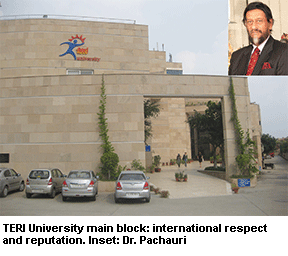A globally respected inter-disciplinary university, TU offers 11 Masters and doctoral studies programmes to 600 — including 140 Ph D — students
 WAY BACK IN 1974, THE LATE and legendary Darbari Seth (1920-99), a visionary director of Tata Sons Ltd, the apex holding company of the Tata Group (estimated annual revenue: Rs.627,597 crore) and prime architect of Tata Chemicals Ltd (sales revenue: Rs.13,977 crore), promoted the Tata Energy Research Institute to “help create an energy structure that would minimise pollution and harmful environmental impacts”. Since then, the institute which morphed into the Delhi-based The Energy and Research Institute (TERI) has established regional centres in Bangalore, Guwahati, Mumbai, Dona Paula (Goa) and Mukteshwar (Nainital), and has acquired a global reputation for research spanning a host of hot-button environmental issues — rural energy, oil and gas, forest conservation, urban transport and air pollution, energy efficiency in industry, as also global climate change.
WAY BACK IN 1974, THE LATE and legendary Darbari Seth (1920-99), a visionary director of Tata Sons Ltd, the apex holding company of the Tata Group (estimated annual revenue: Rs.627,597 crore) and prime architect of Tata Chemicals Ltd (sales revenue: Rs.13,977 crore), promoted the Tata Energy Research Institute to “help create an energy structure that would minimise pollution and harmful environmental impacts”. Since then, the institute which morphed into the Delhi-based The Energy and Research Institute (TERI) has established regional centres in Bangalore, Guwahati, Mumbai, Dona Paula (Goa) and Mukteshwar (Nainital), and has acquired a global reputation for research spanning a host of hot-button environmental issues — rural energy, oil and gas, forest conservation, urban transport and air pollution, energy efficiency in industry, as also global climate change.
It’s a measure of the international respect and reputation TERI has acquired over the past 40 years that in 2007, Dr. R.K. Pachauri, the incumbent chairman of TERI and the Intergovernmental Panel on Climate Change — a scientific organisation promoted by the United Nations — was jointly awarded the Nobel Peace Prize with former US vice-president Al Gore.
“TERI has grown far beyond original expectations, and the spread of the institute’s activities is vast. But one common thread which ties all these activities together, is that of the concept and solutions related to sustainable development. Our faith and commitment centering on sustainable development arises from our conviction that human society, and particularly India as a country has to bring about rapid and substantial transformation for moving to a pathway of sustainability,” says Pachauri, an alumnus of the Indian Railways Institute of Mechanical & Electrical Engineering, Jamalpur and Carolina State University, USA who signed up with TERI in 1982 and is currently director-general of the institute and chancellor of TERI University.
Experiencing a shortage of sufficiently qualified personnel to research the expanding range of TERI’s activities in ecology, environment and sustainable development issues, the directors of the institute promoted the TERI School of Advanced Studies, Delhi in 1998. In 2006, it was upgraded by the University Grants Commission and renamed TERI University (TU), and following a land grant from the Union government moved to a separate two-acre campus in Delhi’s Vasant Kunj. An interdisciplinary postgrad university, TU offers 11 Masters and doctoral studies programmes in natural resources management, biotechnology, policy and regulation, and energy and environment, to its 600 — including 140 Ph D — students.
Globally acclaimed as a unique institution of higher education, TERI University has won numerous awards including an India Today award for the most innovative curriculum in 2012, and was accredited and awarded ‘A’ grade status by the National Assessment and Accreditation Council (NAAC) as also the ‘Greenest University & Research Institution’ at the Climate Change Awards organised in Warsaw (Poland) last year.
Sited on a green lung space in the heart of Delhi, the TU campus which has 80,000 sq. ft. of built-up area offers solar energy, rainwater harvesting and efficient waste management systems, and an earth air tunnel which naturally maintains comfortable temperatures inside its buildings and reduces energy consumption by 50 percent. Moreover, TU students who are served with an on-campus library hosting a collection of 7,000 volumes, also enjoy the advantage of accessing the TERI library stocked with 30,000 volumes and more than 2,000 online journal subscriptions.
For extra-curricular activities and field sports, students have access to TERI’s sports facilities at its Gual Pahari campus, sited 35 km south of Delhi, at Gurgaon. Moreover, TU students’ organisations offer membership of dramatics, sports, reading, biodiversity and media clubs. With ecology and environment preservation, managing climate change and developing sustainable economic models having critically impacted themselves upon the global consciousness, the management of this young varsity looks to the future with optimism.
“We have already been endowed with a Unesco chair on climate change in TU, and will develop a study programme in climatic sciences and policy under an internationally eminent professor. Simultaneously, with water scarcity emerging as a crucial issue and water wars and disputes breaking out between states, we are actively researching water governance and hydrology issues, and TU is setting up a regional cooperation centre on water for SAARC nations. TU is still young but moving in the right direction to nurture leaders for a resource challenged world,” says Dr. Rajiv Seth, registrar of TU.
|
Admission & Fees
For postgrad programmes a Common Entrance Test screens students’ analytical skills and quantitative ability. Shortlisted candidates are interviewed by TERI faculty. For the MBA programmes, scores in CAT/MAT/GMAT/CMAT are required.
Tuition fees (per semester): Rs.40,000- 52,000
Accommodation. TERI University has limited capacity girls’ hostel at its Vasant Kunj campus.
For further information visit www.teriuniversity.ac.in
|
AUTAR NEHRU